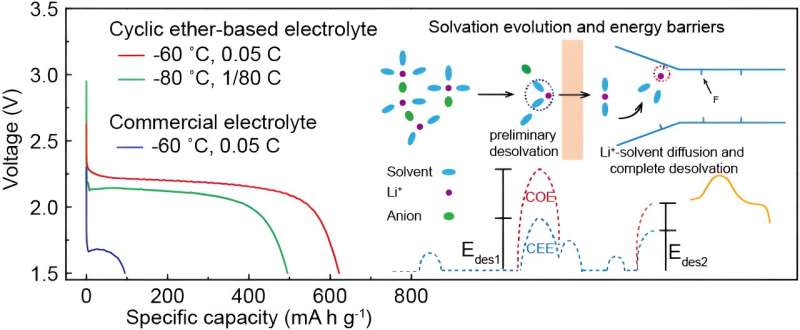The weakly solvating cyclic ether-based electrolyte significantly facilitates overall reaction dynamics closely correlated to lower desolvation barrier, achieving ultralow temperature adaptability up to -80 °C. Credit: Science China Press
In a study published in the journal Science China Chemistry, researchers show how by selecting low melting point solvents and suitable salts and precisely tailoring Li+-coordinated environment via integration of low-affinity solvents with moderate anions, the weakly solvating cyclic ether-based electrolyte is introduced to significantly decrease desolvation activation energies and facilitate reaction kinetics, which are proved by molecular dynamics and binding energy calculation.
Discharged until 1.5V cut-off voltage, the assembled CFx/Li batteries yield 723, 652, and 495 mA h g-1 provided with average output voltages of 2.26, 2.22, and 2.11 V at -40, -60, and -80 °C, corresponding to energy densities of 1634, 1447 and 1044 W h kg-1, the best performances among current organic liquid electrolyte to the best of the researchers' knowledge.
The higher capacity retention up to 82 % is produced at a discharge rate of 15 C (25°C). To further test potential for practical applications, the assembled CFx/Li cells with high load increased to 18-22 mg cm-2 still show energy densities of 1683 and 1395 W h kg-1 at -40 and -60˚C
With this work, researchers have proposed a powerful strategy for electrolyte modification with cost-effectiveness and practical scalability, which has unexploited application value and favorable exploitation foreground for an ultralow-temperature primary battery
More information: Hao-Jie Liang et al, Weakly-solvating electrolytes enable ultralow-temperature (−80 °C) and high-power CFx/Li primary batteries, Science China Chemistry (2023). DOI: 10.1007/s11426-023-1638-0
Provided by Science China Press
























